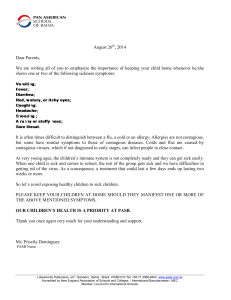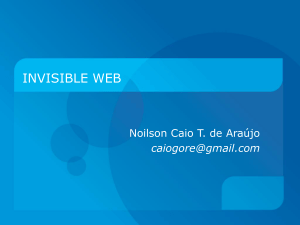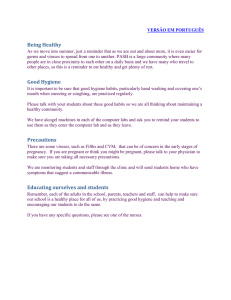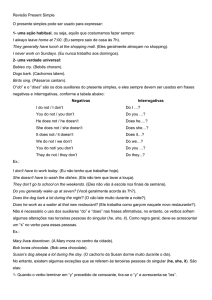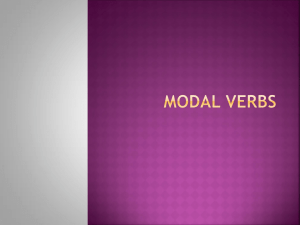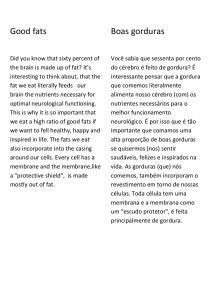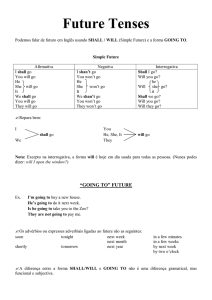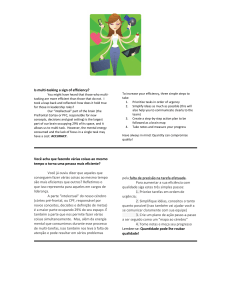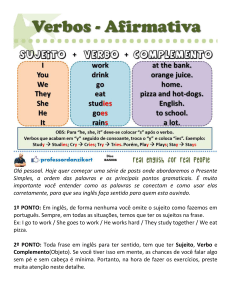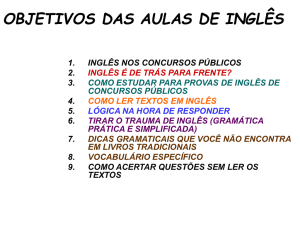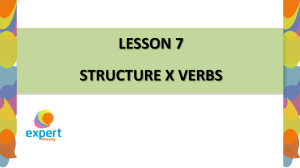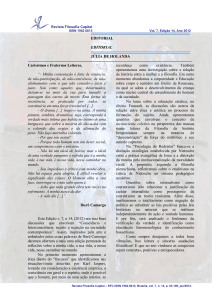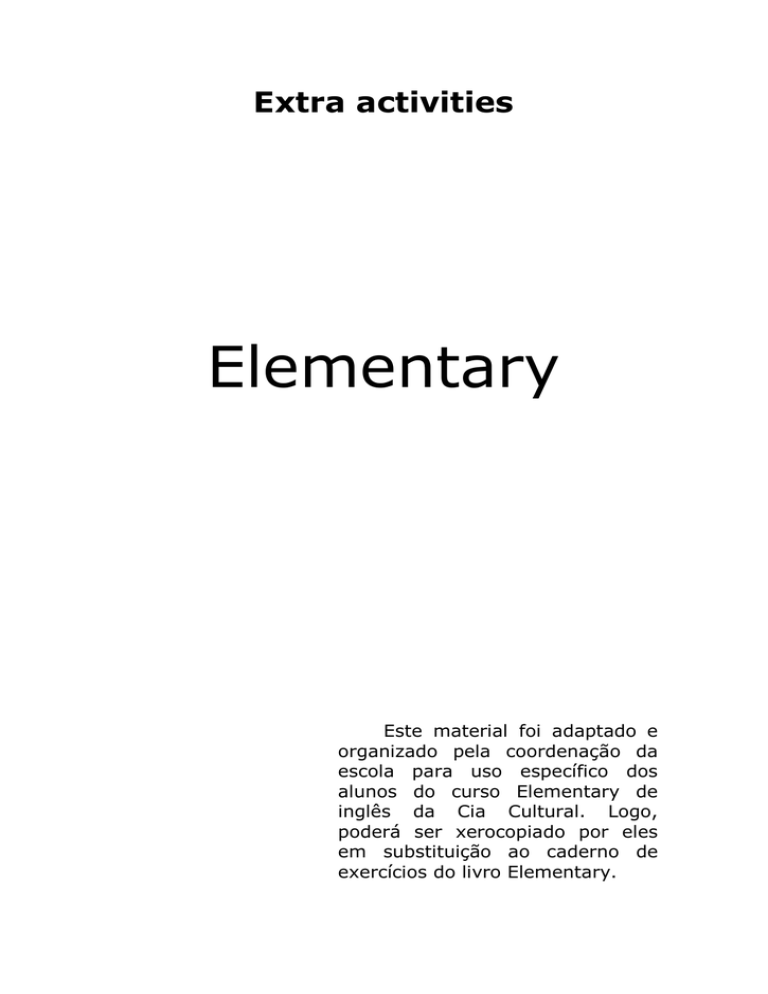
Extra activities
Elementary
Este material foi adaptado e
organizado pela coordenação da
escola para uso específico dos
alunos do curso Elementary de
inglês da Cia Cultural. Logo,
poderá ser xerocopiado por eles
em substituição ao caderno de
exercícios do livro Elementary.
Unit 1
UNIT 1
COUNTRIES
NATIONALITIES
Argentina - Argentina Argentinean – Argentina
Australia - Austrália Australian – Australiana
Austria - Áustria Austrian – austríaca
Belgium – Bélgica Belgian – belga
Brazil - Brasil Brazilian - brasileira
Canada – Canadá Canadian – canadiana
China – China Chinese – chinesa
Denmark - Dinamarca Danish – dinamarquesa
England - Inglaterra English - Inglesa
Estonia – Estónia Estonian - estónia
Finland – Finlândia Finnish - finlandesa
France – França French - francesa
Germany – Alemanha German - alemã
Greece – Grécia Greek - grega
Hungary – Hungria Hungarian - húngara
India – Índia Indian – Indiana
Ireland - Irlanda Irish – irlandesa
Italy - Itália Italian – italiana
Japan – Japão Japanese – japonesa
Luxembourg – Luxemburgo Luxembourgish –
Luxemburguesa
Mexico – México Mexican – mexicano
New Zealand – Nova Zelândia New Zealander –
neozelandesa
Norway – Noruega Norwegian – norueguesa
Pakistan – Paquistão Pakistani – paquistanesa
Poland – Polónia Polish – polaca
Portugal – Portugal Portuguese – portuguesa
Scotland – Escócia Scottish – escocesa (britânica)
South Africa – África do Sul South african – sul-africana
Spain – Espanha Spanish – espanhola
Sweden – Suécia Swedish – sueca
Switzerland – Suíça Swiss – suíça
The Netherlands – Holanda Dutch – holandesa
Turkey – Turquia Turkish – turca
United Kingdom – Reino Unido British – britânica
USA – Estados Unidos da América American- americana
Wales – País de Gales Welsh – galesa (britânica)
Grammar review
Como já vimos muitas vezes o verbo “to be” pode significar
‘ser’ ou ‘estar’, dependendo do contexto em que é
empregado. Este é um forte que não precisa auxiliar, e
também é um verbo muito usado em inglês. Quem ainda
não aprendeu aproveite agora para sanar todas as duvidas
possíveis.
Infinitivo:
“I want to be with you” – ‘Eu quero estar com você.’
“I want to be a teacher.” – ‘Eu quero ser professor(a).’
Reveja agora conjugado no tempo presente:
Conjugado no tempo presente:
“I am your teacher.” – ‘Eu sou seu/sua professor(a).’
“She is american.” – ‘Ela é americana.’
“It is my dog.” – ‘Ele/ela é meu/minha cachorro(a).’
“We are japaneses.” – ‘Nós somos japoneses(as).
“They are my parents.” - ‘Eles são meus pais.’
Agora aproveite o vocabulario das nacionalidades e
faça você mesmo frases usando as nacionalidades e o
verbo to be:
_______________________________________________
_______________________________________________
_______________________________________________
_______________________________________________
Formas contraídas
Como vocês já viram no Starter é muito comum usarmos o
verbo “to be” em suas formas contraídas, abreviadas. Isso
porque fica mais curto, fácil e às vezes, mais sonoro
também.
I am – I’m
I am not – I’m not
You are – You’re
You are not – You aren’t
He is – He’s
He is not – He isn’t
She is – she’s
She is not – She isn’t
It is – It’s
It is not – It isn’t
We are – we’re
We are not – We aren’t
They are – They’re
They are not – They aren’t
Atenção: Ainda não vimos está possibilidade, porém você
também pode optar pela contração na interrogativa
negativa, especialmente em ocasiões de uso informal da
língua ou nas chamadas “question tags”, frases
interrogativas curtas, usadas quando queremos confirmar
algo.
Veja a lista completa de contrações (interrogativa
negativa):
* Aren’t I?
(Aren’t I your friend?)
Aren’t you?
(Aren’t you in Brazil?)
Isn’t he?
(Isn’t he your brother?)
Isn’t she?
(Isn’t she the teacher?)
Isn’t it?
(Isn’t it new?)
Aren’t we?
(Aren’t we at home?)
Aren’t they? (Aren’t they your parents?)
Atenção, pois temos exceção:
Para construirmos a forma contraída interrogativa negativa
com a primeira pessoa do singular, “I”, tomamos
emprestado o “are”, que dá origem à forma: “aren’t I?”.
Neste caso, ao invés de termos: “Amn’t I?” teremos:
“Aren’t I?”.
Exemplos de “question tags”:
I am your friend. Aren’t I?
You are my boss. Aren’t you?
He is here. Isn’t he?
She is my teacher. Isn’t she?
It is my dog. Isn’t it?
We are friends. Aren’t we?
They are at home. Aren’t they?
Exercises
1.0 - NOW, answer these questions:
Are you a teacher or student?
_______________________________________________
Are you a boy or a girl?
_______________________________________________
Are you from Brazil?
_______________________________________________
Are you in Brazil now?
_______________________________________________
Are you american?
_______________________________________________
Is your teacher american?
_______________________________________________
Is your mother at home now?
_______________________________________________
Is your father or mother at work?
_______________________________________________
Are you at school?
_______________________________________________
Are you with your friends now?
_______________________________________________
Are you with your family?
_______________________________________________
Is your mother with you now?
_______________________________________________
Are your relatives from Spain?
_______________________________________________
Are your parents from Italy?
_______________________________________________
Are you all right?
_______________________________________________
2.0 - Complete the sentences
1 She _______________ from Unaí, Minas Gerais.
2 _______________ your friend American?
3 They _______________ married. No, they are single.
4 Your teacher _______________ Australian.
5 _______________ they Japanese?
6 _________________ she your best friend?
7 It _______________ my dog and it ________ his cat.
8 I _____________ not a doctor. I___________ a dentist.
9 You __________________ from Spain. Aren’t you?
10 We ________________ friends. We’re together.
11 We ______________ children. Aren’t we?
12 You ___________ my parents. You’re my family.
13 You _________________ doctors. Aren’t you?
14 They ___________ my relatives. They’re from the USA.
15 They _____________ friends. Aren’t they?
3.0 - Write a or an
_______________ brother
_______________ house
_______________ uncle
_______________ Italian
_______________ phone number
4.0 - Write the correct pronoun
_______________ sister is an architect, not me.
Is this _______________ phone? It’s not mine.
Are they _______________ children? They have the same
surname as him.
This is _______________ house. We live here.
Gabriel is married to Ana Paula: he is ___________
husband.
VOCABULARY
5.0 Complete the table using words from the box
Country
Nationality
Argentina
Brazil
Turkish
Greek
China
6.0 - Choose a word from the box to make a pair
student / secretary / househusband / nurse / judge
doctor and _______________
manager and _______________
teacher and _______________
lawyer and _______________
housewife and _______________
READING
Read about Anna and complete the form
My name is Ana Paula. I’m from Brasil. I’m a
journalist. I live in Uberlândia. You can
contact me on (34) 92629237, or at
[email protected]
First Name: Ana
Surname: _______________
Nationality: _______________
Occupation: _______________
Telephone: _______________
Email: _______________
More vocabulary and Exercises
Countries and nationalities
1.0 - Complete with countries and nationalities.
Country
Nationality
(1) _____________
Russian
Brazil
(2) _____________
(3) _____________
Spanish
China
(4) _____________
(5) _____________
Italian
be: present simple affirmative
2.0 - Complete the sentences with the correct form of
be.
a)
__________ your camera Japanese?
b)
I __________ from Madrid.
c)
We __________ Polish.
d)
__________ you American?
e)
She __________ from Germany.
f)
__________ they from China?
a / an
3.0 - Underline the correct word.
a)
a / an toothbrush
b)
a / an apple
c)
a / an umbrella
d)
a / an diary
this / these
4.0 - Complete the questions with this or these.
a)
What’s _____________ ? It’s a bag.
b)
What’s _____________ ? It’s a pen.
c)
What are _____________ ? They’re watches.
d)
What’s _____________ ? It’s my camera.
e)
What are _____________ ? They’re keys.
5.0 - Complete the conversation with the words in
the box.
repeat
say
sorry
spell
thanks
Student: How do you (1) _____________ ‘clefs’ in
English?
Teacher: Keys.
Student: How do you (2) _____________ it?
Teacher: K-E-Y-S.
Student: Can you (3) _____________ that, please?
Teacher: Yes, it’s K-E-Y-S.
Student: (4) _____________ ?
Teacher: K-E-Y-S.
Student: Oh! Keys. OK, (5) _____________ .
WRITING
6.0 - Use this information to complete the sentences.
Surname: Moreira
First Name: Eduardo
Marital Status: Single
Occupation: Dentist
Languages: French, English
His name _______________ Eduardo Moreira.
___________________dentist.
_______________ married. He _______________ French
_______________ English.
7.0 – Now write about you
My name is ______________________________________
_______________________________________________
_______________________________________________
_______________________________________________
Family
8.0 - Add the missing vowels (a, e, i, o, u) to
complete the male and female family words.
Male
Female
a)
h_sb_nd
w_f_
b)
b r _ t h _ rs _ s t _ r
c)
_ncl_
d)
n_ph_wn__c_
e)
f_th_r
m_th_r
f)
s_n
d__ght_r
__nt
9.0 - Complete with the words in the box.
aunt
cousins
nephews
brother-in-law
sister-in-
law
a)
My father’s sister is my __________________ .
b)
My brother is Tom. He’s married to Deb. She’s my
__________________ .
c)
I have five __________________ . They are my
uncles’ children.
d)
I have one sister. She isn’t married, so I don’t have a
__________________ .
e)
My brother has two sons. They’re my
__________________ .
Possessive ’s / s’
10.0 - Underline the correct word.
a)
My brother’s / brothers’ name is Franco.
b)
Is your father’s / fathers’ car new?
c)
Our niece’s / nieces’ husbands are doctors.
d)
My sister’s / sisters’ child is two years old.
e)
His daughter’s / daughters’ names are Kelly and
Kim.
Unit 2
Unit 2
Grammar - Structure
Vamos relembrar um pouco mais. Você já sabe que quando
queremos afirmar ou contar algo no tempo presente, basta
colocarmos o verbo desejado depois da pessoa (pronome),
e está feito.
Por exemplo: I (pessoa) + work (verbo) = I work (Eu
trabalho)
Continuando: Para construirmos uma pergunta no tempo
presente em língua inglesa, usamos uma palavrinha que
não é traduzida no português o auxiliar, “Do”. (Caso vá ao
dicionário irá ver que significa fazer porém como auxiliar
não usamos está tradução.) Ele aparece logo no início da
frase indicando que se trata de uma pergunta sobre hábitos
ou acontecimentos no tempo presente.
Perceba que para fazermos a pergunta “Você trabalha?” em
língua inglesa, temos a seguinte sequência de palavras :
“Do you work?”
Já na resposta afirmativa, “Yes, I do or yes, I work” =
“Sim, eu trabalho” o auxiliar “Do” poderá ou não aparecer.
Sabemos que este tempo verbal pede o uso de ES,Do na
primeira pessoa e DOES,DOESN`T na terceira
pessoa(he,she,it.).Veja:
1)O tempo verbal present simple (ou simple present) tem
as seguintes formas:
I like eu gosto
you like tu gostas
he / she / it likes ele(a) gosta
we like nós gostamos
you like vós gostais
they like eles(as) gostam
A tradução (para a língua portuguesa) da conjugação deste
tempo verbal present simple é apenas um dos exemplos
possíveis entre vários, estando este tempo verbal
dependente do contexto de uma frase.
Na negativa:
I do not like - I don't like
you do not like - you don't like
he / she / it does not like - he / she / it doesn't like
we do not like - we don't like
you do not like - you don't like
they do not like - they don't like
na interrogativa:
Do I like?
Do you like?
Does he / she / it like?
Do we like?
Do you like?
Do they like?
na interrogativa negativa:
Do I not like? - Don't I like?
Do you not like? - Don't you like?
Does he / she / it not like? - Doesn't he / she / it like?
Do we not like? - Don't we like?
Do you not like? - Don't you like?
Do they not like? - Don't they like?
nas respostas breves:
Yes, I / you / we / they do.
he / she / it does.
No, I / you / we / they do not / don't.
he / she / it does not / doesn't.
Exercises
1.0 - Now answer the questions
Por exemplo: Para a pergunta: “Do you like to travel?”
prefira “Yes, I like to travel.” ao invés de apenas “Yes.” ou
“Yes, I like.”
1. I work. And you, do you work?
_____________________________________________
2. I don’t like to work. And you, do you like to work?
_____________________________________________
3. I travel. And you, do you travel?
_____________________________________________
4. I like to travel. And you, do you like to travel?
_____________________________________________
5. I study. And you, do you study?
_____________________________________________
6. I like to study. And you, do you like to study?
_____________________________________________
2.0 - Make interrogative sentences.
1. We work with my friends.
_____________________________________________
2. You work with your family.
_____________________________________________
3. I study Portuguese with my teacher.
_____________________________________________
4. You like to study English.
_____________________________________________
5. I like to study with my friend.
_____________________________________________
6. You like to travel with your friend.
_____________________________________________
7. I like to travel with my family and friends.
_____________________________________________
8. I like to study English with you.
_____________________________________________
9. We study English together.
_____________________________________________
10. I like to work and study with my friends.
_____________________________________________
11. I don’t like to travel alone.
_____________________________________________
12. We work together.
_____________________________________________
13. We don’t like to work alone.
_____________________________________________
14. She likes to work in Cia Cultural.
_____________________________________________
15. He doesn´t study portuguese.
_____________________________________________
16. It doesn´t eat meat.
_____________________________________________
17. He meets Xuxa.
_____________________________________________
18. She watches filmes at home.
_____________________________________________
Caso queira conferir seu entendimento aqui está a
tradução das frases/ respostas acima:
1. Eu trabalho com meus amigos / minhas amigas.
2. Você trabalha com sua família.
3. Eu estudo português com meu professor / minha
professora.
4. Você gosta de estudar inglês.
5. Eu gosto de estudar com meu amigo / minha amiga.
6. Você gosta de viajar com seu amigo / sua amiga.
7. Eu gosto de viajar com minha família e amigos / amigas.
8. Eu gosto de estudar com você.
9. Nós estudamos inglês juntos(as).
10. Eu gosto de trabalhar e estudar com meus amigos /
minhas amigas.
11. Eu não gosto de viajar sozinha.
12. Nós trabalhamos juntos(as).
13. Nós não gostamos de trabalhar sozinhos(as).
14. Ela gosta de trabalhar na Cia Cultural
15. Ele não estuda português
16. Ele/ela não come carne.
17. Ele conhece a Xuxa.
18. Ela assiste filmes em casa
3.0 – Now answer these questions
1. Do you like to study?
_____________________________________________
2. Do you study Portuguese or English?
_____________________________________________
3. Do you like to study English?
_____________________________________________
4. Do you like to study with your family?
_____________________________________________
5. Do you like to study alone?
_____________________________________________
6. I like to work, and you?
_____________________________________________
7. Do you like to work with your friends?
_____________________________________________
8. I like to travel, and you?
_____________________________________________
9. Do you like to study English with your teacher?
_____________________________________________
10.
Do you like to study or work?
_____________________________________________
11.
I like to travel with my family, and you?
_____________________________________________
12.
I don’t like to travel alone, and you?
_____________________________________________
13. Do we study English together?
_____________________________________________
14. Do you work in the morning?
_____________________________________________
15. Do you study at night?
__________________________________________________________________
16. Do you work in the morning or at night?
____________________________________________
18. I don’t like to work at night, and you?
_____________________________________________
19. At night, I like to study English. Do you like to study
English at night?
__________________________________________________________________
20. I don’t like to travel in the afternoon, and you?
_____________________________________________
21. Do you like to work with your family or alone?
_____________________________________________
22. I don’t study Portuguese, I study English. And you?
_____________________________________________
22. Does your friend speak English?
_____________________________________________
23. Does your sister want go home now?
____________________________________________
24. Does she want to stay here?
____________________________________________
25. Does your father like rice and beans for lunch?
_____________________________________________
26. Does he like meat or chicken?
____________________________________________
27. Does he eat rice and beans every day?
_____________________________________________
28. Does he drink coffee or tea in the morning?
_____________________________________________
29. Does your daughter like to go to school in the morning
or afternoon?
_____________________________________________
30. Does your client need to go now?
_____________________________________________
Daily Rotine and grammar
1.0 - Write the correct form of the verb.
1 I (get up) at 7 o’clock.
_______________________________________________
2 We (take) clients to the office.
_______________________________________________
3 He (listen to) music all day.
_______________________________________________
4 They (work) in a museum.
_______________________________________________
5 José (speak) French and German.
_______________________________________________
6 Ana (have) lunch at 12:00.
_______________________________________________
7 We (walk) to work at 7:00.
_______________________________________________
8 You (leave) school at 5:00.
_______________________________________________
9 She (go) to bed.
_______________________________________________
2.0 - Write this, that, these or those.
What’s _______________ in here? It’s my cd player.
What are _______________ over there? They’re my shoes.
Are _______________ my keys? No, they’re mine.
What’s _______________ by the door. It’s my coat.
Is _______________ your camera? No mine’s over there.
3.0 - Write the plural.
hotel _______________ watch _______________
family _______________ machine _______________
desk _______________
4.0 - Write when, where or what.
_______________do they open?
_______________does he live?
_______________time does it open?
_______________do you do?
_______________do you play football on Fridays?
5.0 - Write do or does.
_______________ you speak Spanish?
_______________ she work in Italy?
_______________ they play tennis?
_______________ you like your work?
_______________ he have a job?
6.0 - READING
Martin Soares is a househusband. He gets up early and
makes the breakfast. His children leave home for school at
half past eight. Then he washes the dishes. After that he
cleans the house and goes shopping. In the evening he
helps the children with their homework. He always goes to
bed after midnight.
True or False?
Martin doesn’t make breakfast._____
Martin’ children go to school. _____
He does the housework. _____
He does the homework. _____
He goes to bed early. _____
7.0 - WRITING
Use the notes to complete the sentences about
Carla’s routine
breakfast: 8 o’clock / leave house: 8.30 / start work: 9.00 /
Finish work:5.00 / Bed: 11.00
Carla __________________________________________
She ___________________________________________
_______________________________________________
_______________________________________________
_______________________________________________
_______________________________________________
_______________________________________________
Grammar
Possessive determiners
8.0 - Complete the sentences with a possessive
determiner.
a) Hi, I’m a doctor. _____________ name is Phil.
b) They’re actors. _____________ favourite film is Star
Wars.
c)
He’s French but _____________ wife is English.
d) We’re Russian. _____________ names are Olga and
Natalia.
e) She’s a waitress. _____________ favourite food is
pasta.
f)
It’s my cat. _____________ favourite drink is tea.
be: present simple
9.0 - Complete the questions and answers.
a) ___________ Roberto a taxi driver? Yes, he
___________ .
b) ___________ you Japanese? No, I ___________ .
c)
___________ your parents over seventy years old?
Yes, they ___________ .
d) ___________ your mother a teacher? No, she
___________ .
e) ___________ you singers? No, we ___________ .
Useful phrases
10. 0 - Match the useful phrases (a–d) to the
responses (1–5).
a)
b)
c)
d)
How are you?
Hi!
This is Bert.
Bye.
1
2
3
4
See you.
Nice to meet you.
Hello!
I’m fine, thanks.
a / an
11.0 - Underline the word, a or an.
a)
b)
c)
d)
e)
He’s a / an actor.
Are you a / an singer?
She isn’t a / an English teacher.
She’s a / an university student.
He’s a / an hairdresser.
Reading
12.0 - Read the text and underline the correct
information.
a)
Rita is under 20 / 30 years old.
b)
She isn’t American / Brazilian.
c)
Her favourite person is her mother / her father.
d)
Her favourite sports are swimming and football /
swimming and tennis.
e)
Her favourite actor / singer is Diane Krall.
My favourite things
Hi! I’m Rita da Silva. I’m 25 and I’m a singer. I’m from New
York but I’m not American, I’m Brazilian. My mother is
American and my father is Brazilian. My mother, Linda, is
my favourite person – she’s lovely! My favourite animal is
my horse, Star. He’s four years old. My favourite sports are
swimming and tennis. My favourite actor is Barbara
Streisand and my favourite singer is Diane Krall.
Unit 3
Grammar
O tempo presente na negativa é muito simples. Basta
acrescentarmos o “don’t” ou “do not” depois da pessoa (I,
You ou We).
Veja só:
I (pessoa) + don’t (auxiliar) + work (verbo) = I don’t
work (Eu não trabalho)
Também podemos utilizar a forma sem contração “do not”:
I (pessoa) + do not (auxiliar) + work (verbo) = I do not
work (Eu não trabalho)
A forma dos not é equivalente à forma contraída don’t; no
entanto, esta acaba sendo um pouco mais utilizada em
algumas situações devido à praticidade, por ser mais curta.
He (pessoa) + doesn’t (auxiliar) + work (verbo) = He
doesn’t work (Ele não trabalha)
Também podemos utilizar a forma sem contração “does
not”:
She (pessoa) + does not (auxiliar) + work (verbo) = I
does not work (Ela não trabalha)
A forma does not é equivalente à forma contraída doesn’t;
no entanto, esta acaba sendo um pouco mais utilizada em
algumas situações devido à praticidade, por ser mais curta.
Vamos treinar um pouco?
Coloque perguntas para estas respostas:
1. I don’t like.
_____________________________________________
2. No, I don’t like.
_____________________________________________
3. You don’t like.
_____________________________________________
4. We don’t like.
_____________________________________________
5. I don’t travel.
_____________________________________________
6. No, I don’t travel.
_____________________________________________
7. You don’t travel.
_____________________________________________
8. We don’t travel
_____________________________________________
9. I don’t work.
_____________________________________________
10. No, I don’t work
_____________________________________________
11. You don’t work.
_____________________________________________
12. We don’t work
_____________________________________________
13. I don’t study.
_____________________________________________
14. No, I don’t study.
_____________________________________________
15. You don’t study.
_____________________________________________
16. We don’t study.
_____________________________________________
17. I don’t like to travel
_____________________________________________
18. You don’t like to travel.
_____________________________________________
19. We don’t like to travel.
_____________________________________________
20. I don’t like to work
_____________________________________________
21. You don’t like to work.
_____________________________________________
22. We don’t like to work.
_____________________________________________
23. I don’t like to study.
_____________________________________________
24. You don’t like to study.
_____________________________________________
25. We don’t like to study.
_____________________________________________
Verb Can
O verbo Can significa "poder", "saber fazer algo".
Usa-se para:Dizer que algo é possível ou que alguem tem a
habilidade de fazer algo.
•You can see the square from your window
(Voce pode ver a praça da sua janela)- possibilidade.
•Can you speak any foreign language?
(Voce pode(ou sabe)falar alguma lingua estrangeira?)-habilidade
•It can rain tonight
(Pode ser que chova esta noite)- possibilidade.
•He can swim like a fish
(Ele nada como um peixe)-habilidade.
•Can you read and write?
(Você sabe ler e escrever?)-habilidade
• Pedir, dar ou negar permissão:
•Can I go out for lunch now?
(Posso sair para o almoço agora?)
•That's ok.You can go out now
(Esta bem.Você pode sair agora.)
•Mom,can I go to the disco with my friends?
(Mãe posso ir a danceteria com meus amigos?)
•You can't go because you are too young yet.
(Você não pode ir porque ainda é muito jovem)
Could (simple past of Can).
Usa-se nas mesmas situações de Can:
32
Grammar Exercises
1.0 - Write the negative
1 I get up at five o’clock.
__________________________________________________
2 Nicolas plays the piano.
__________________________________________________
3 Mario paints pictures.
__________________________________________________
4 José sings at work.
__________________________________________________
5 We like jazz.
6 She can dance
__________________________________________________
7 Pedro Henrique can sing.
__________________________________________________
8 She likes jazz and rock.
__________________________________________________
9 Marilia works so much.
__________________________________________________
10 They can dance.
__________________________________________________
33
2.0 - Write can or can’t.
Miguel _______________ play football. He’s no good at it.
Marcos _______________drive. He passed his test.
I _______________sing. I’m terrible.
I can play the guitar but I can’t _______________ the piano.
_______________you speak French? No, I can’t
3.0 - Complete the sentences
meet/station/eight o’clock. Let’s_______________
go/cinema? Why_______________
come/office/next week? Can_______________
Italian restaurant/Crown Road? How_______________
we/do/weekend? What_______________
4.0 - Match the verbs with the activities
Verb
Go
Have
Ride
listen to
Play
Activity
lunch
the piano
the radio
running
A bike
34
On Saturday mornings I go to the shop for the newspaper.
When I get home I make breakfast, then I sit down and
read the paper while I eat. Usually at about 11 o’clock, I go
to the supermarket. That takes about two hours, so I have
lunch then. In the afternoon, sometimes I go to watch
football. Other times, I go for a walk or read a book. In the
evening I always meet my friends, at the pub.
5.0 - True or False?
The
The
The
The
The
writer
writer
writer
writer
writer
reads the paper in the morning.
doesn’t go to the supermarket in the afternoon.
has lunch after shopping.
always reads in the afternoon.
goes for a walk, sometimes.
6.0 - Use the notes to write about your free time.
Every day watch TV
Monday go to the gym
Thursday do judo
At weekends get a takeaway meal/go to the cinema
I _______________ every day. On Monday _______________
for an hour. On Thursday _______________. I keep fit in the
week, so at weekends _______________ and
_______________.
35
7.0 - Complete the sentences with the correct form of the
verbs in the box.
buy
do
eat
have
go
live
play
watch
a)
I __________ TV in the morning.
b)
She __________ two sisters.
c)
We __________ in Madrid.
d)
My son __________ to bed early.
e)
He __________ games on his computer.
f)
My mother __________ the housework.
g)
We __________ meals together on the sofa.
h)
My brother __________ flowers for his wife.
Useful phrases
8.0 - Complete the conversation with the words and
phrases in the box.
call
drive
forget
good time
worry
Jill: Bye, Dad.
Dad: Bye! (1) ___________ carefully!
Jill: OK.
Dad: Have a (2) ___________ !
Jill: Thanks, Dad.
Dad: Don’t (3) ___________ your keys.
Jill: They’re in my bag.
Dad: (4) ___________ us on your mobile phone!
Jill: OK, Dad. Don’t (5) ___________ .
36
Reading
9.0 - Read the text about a large family. Write the name
of the person described in each sentence (a–e).
a)
She has seven sisters. ______________
b)
He has four brothers. ______________
c)
She has four uncles. ______________
d)
He has five children. ______________
e)
She has four cats. ______________
Hi, I’m Brigit and I have a big family. My mother, Janet, has
seven sisters. My father, Norman, has four brothers and two
sisters. So, I have nine aunts, four uncles and twenty-four
cousins! My mother and father have five children: me, and my
three brothers and one sister. We all live at home and we go out
together at the weekends. We have a big car! My favourite
relative is my aunt Susan. She’s seventy years old and she lives
in London. She isn’t married, but she has four cats!
37
like / don’t like + ing
1
Complete the text with the words in the box.
doesn’t
hates
likes
mind
really
Gabriel loves sport, and he (1) __________ loves football. He
likes being outside. He hates cities and he (2) __________
shops. He (3) __________ like shopping. His girlfriend, Julia,
hates cooking. But she likes food, and she (4) __________
eating in expensive restaurants. She doesn’t (5) __________
football.
2
Write the ing form of the verbs.
a)
read _____________
b)
study _____________
c)
dance _____________
d)
cook _____________
e)
swim _____________
f)
dance _____________
g)
ride ______________
h)
like ______________
38
3
Complete the sentences with the correct form of the
verbs.
a)
I _____________ (work) in a restaurant.
b)
My mother _____________ (watch) TV at home.
c)
We _____________ (chat) online all the time.
d)
My brother _____________ (have) ten pairs of trainers.
e)
Andreas _____________ (go) to the pub in the evening.
f)
My parents _____________ (play) tennis at the weekend.
4
Underline the correct word.
a)
Do / Does you like watching football on TV?
Yes, I do / does.
b)
Do / Does Betty like cooking?
No, she don’t / doesn’t.
c)
Do / Does your friends have a big car?
No, they don’t / doesn’t.
d)
Do / Does your father drink beer?
Yes, he do / does.
Object pronouns
5
Complete with object pronouns.
a)
That’s my bag. Please give it to _____________ .
b)
That’s Cathy’s pen. Give it to _____________ , please.
c)
Do you like chocolate? I love _____________ .
d)
My new boyfriend is called Rick. That’s _____________ in
the photo.
e)
Those singers are terrible! I don’t like ___________ at all.
39
Useful phrases
6
Complete the conversation with the words in the box.
about
agree
great
OK
terrible
think
Bob: What do you (1) _____________ of the Pirates of the
Carribean film?
Emily:
It’s (2) _____________ .
Bob: What? Terrible? I think it’s great! Do you like Orlando
Bloom?
Emily:
Yes, he’s really (3) _____________ . What (4)
_____________ you? Do you like him?
Bob: Hmm. I don’t know. He’s (5) _____________ . But I really
like Kiera Knightly.
Emily:
What about Johnny Depp? I love him!
Bob: Oh, yes, I (6) _____________ . He’s great.
40
Unit 4
41
1.
How much?
2.
How many?
As expressões “how much” (‘quanto’, ‘quanta’) e “how many”
(‘quantos’, ‘quantas’) se referem a quantidade.
“how much” é utilizado para se referir à quantidade de coisas
incontáveis; enquanto “how many” é utilizado com as contáveis.
Exemplos:
“How much sugar do you want?” – ‘Quanto açúcar você quer?’
(substância incontável)
“How many cars do you have?” – ‘Quantos carros você tem?’
(bem contável)
Na dúvida, em geral, basta tentar acrescentar um numeral antes
da palavra em questão. Se ela permitir um número
antecedendo-a, é contável; caso contrário, prefira “how much”.
Exemplo:
“1 sugar” não é uma construção possível.
“1 car” é uma construção possível e comum.
No entanto, não se trata de regra, apenas uma dica, visto que,
em língua inglesa, excepcionalmente, pode acontecer de
algumas palavras aparentemente contáveis serem consideradas
incontáveis. Esses casos serão abordados mais adiante.
42
Now… Answer these questions
1. How much money do you have now?
_________________________________________________
2. How much money do I need to buy a car?
_________________________________________________
3. How much coffee do you drink: a lot?
_________________________________________________
4. How much candy do you eat?
_________________________________________________
5. How much wine do you drink on weekends?
_________________________________________________
6. How much beer does your husband usually drink?
_________________________________________________
7. How much do you need?
_________________________________________________
8. How many houses do you have?
_________________________________________________
9. How many shoes do you have?
_________________________________________________
10.
How many children do you want to have?
_________________________________________________
11.
How many brothers and sisters do you have?
_________________________________________________
43
12.
How many beers do you usually drink when you go
out?
_________________________________________________
13.
How many clients do you have?
_________________________________________________
14.
How many newspapers do you read every day?
_________________________________________________
15.
How many teachers do you have?
_________________________________________________
16.
How many glasses do you have?
_________________________________________________
17.
How many pets do you have at home?
_________________________________________________
18.
How many emails do you read every day?
_________________________________________________
19.
How many sports do you play?
_________________________________________________
20.
How many books do you have?
_________________________________________________
21. How many pencils do you have?
_________________________________________________
44
1 GRAMMAR
1.0 - Write C (Countable) or U (Uncountable)
1 cheese _____
2 burger _____
3 banana _____
4 rice _____
5 coffee _____
2.0 - Write How much or How many.
6 __________ money do you have?
7 __________ biscuits do you want?
8 __________ litres of milk?
9 __________ ice cream is there?
10 __________ sandwiches?
3.0 - Write a, an, some or any.
11 Do you have __________ butter?
12 We don’t have __________ lamb.
13 We have __________ vegetables.
14 Do you have __________ apple?
15 We don’t have __________ apples.
45
4.0 - Choose the correct word
16
17
18
19
20
This drink is for she/her. _____
We/Us live here. _____
Give it to they/them. _____
Can you telephone I/me? _____
He/Him is hungry. _____
VOCABULARY
5.0 - Write F (Food) or D (Drink)
21
22
23
24
25
tea _____
pineapple _____
orange juice _____
fries _____
watermelon _____
Japanese people have a very healthy diet. They eat a lot of
fish, and there are always vegetables served with every
meal. They eat meat, but much less than Europeans or
Americans. Nearly every meal is served with rice.
Convenience foods are popular with young people and busy
businessmen.
6.0 - True or False?
The Japanese have a good diet. _____
They eat fish or vegetables. _____
They eat meat, like the Europeans. _____
They always eat rice. _____
They never eat convenience foods. _____
46
Useful phrases
7.0 - Complete the conversations with the words in the
box.
bill
is it
receipt
is
Can I have
Man:
How much (1) _____________ to the airport?
Taxi driver:
£25.
Man:
OK. Can I have a (2) _____________ , please?
Woman: How much (3) _____________ a bottle of water?
Waiter: £2, madam.
Woman: OK. (4) _____________ one bottle of water, please?
And can I have the
(5) _____________ , please?
Waiter: Of course, madam.
Reading
8.0 - Read the text about Ludmila’s day. Complete the
sentences.
a) Makiko works at a ___________________ .
b) She ___________________ at 10.00 a.m.
c)
She ___________________ at 4 o’clock in the afternoon.
d) She leaves work at ___________________ .
e) She ___________________ before she goes to bed.
Ludmila is a waitress. She works in the evenings at a restaurant
in London. She gets up every day at 10.00 a.m. After breakfast
she goes to the gym or goes shopping. She has lunch and then
goes to work at 4.00 p.m. She works at the restaurant and
finishes work at midnight. She drives home and has something
to eat. Then she watches TV until 1.30 a.m. and goes to bed.
It’s a long day!
47
Countable and uncountable nouns
Review exercises
1
Put the words in the box in the correct column in the
chart.
cauliflower
Singular
countable
melons
cheese
plural
countable
onion
olive oil
uncountable
2
Choose the correct word to complete the sentences.
1
There’s ____________ banana in my bag.
(a) two (b) some (c) a
There’s ____________ bread in the kitchen.
(a) a (b) some (c) one
There isn’t ____________ meat for you.
(a) a (b) some (c) any
Are there ____________ lemons in the fridge?
(a) some (b) any (c) a
There’s ____________ water on the table.
(a) some (b) one (c) any
2
3
4
5
How much...? / How many...?
3
Complete the questions with How much...? or How
many...?.
a)
b)
c)
d)
e)
________________
________________
________________
________________
________________
rice is there?
eggs do we need?
pasta did you buy?
chips did you eat?
milk is there?
48
Unit 5
49
Diferença entre HAVE GOT e have
“Have” e “have got” podem ser considerados uma das duplas
mais usadas e abusadas da língua inglesa. Ambos, em termos
gerais, significam a mesma coisa – ter. Assim,
eu tenho = I have ou I have got
você tem = you have ou you have got
ele/ela tem = he/she has ou he/she has got
Frequentemente, alunos e alunas, fazem a seguinte pergunta:
“qual a diferença entre have e have got?” A resposta que mais
se ouve: “have” é inglês americano; “have got”, inglês
britânico. Mas... (como você bem sabe sempre terá um “mas”
para nos infernizar!).
Em inglês americano é comum o uso do “have got” na fala.
Curiosamente, eles fazem uso do “have got” de modo bem
diferente. Por mais estranho que possa parecer os americanos
usam apenas o “got”! Isto mesmo eles jogam o “have” na lata
do lixo e fazem uso apenas do “got”.
Para nós, brasileiros, isto causa a maior confusão; pois, nas
escolas de inglês – e livros – aprendemos que “got” é o passado
de “get”. Aí, quando ouvimos uma sentença como “he got a
girlfriend”, ficamos com a sensação de que nosso inglês é
péssimo. Na verdade não é! Simplesmente, as escolas – e os
livros – omitem esta informação, ou seja, ninguém nunca nos
ensinou isto.
Para comprovar isto, basta assistir a um filme ou seriado norteamericano. Quase sempre você ouve alguém dizendo sentenças
como:
What you got there? (O que você tem aí?)
I got brothers and sisters. (Tenho irmãos (e irmãs))
You got anything to tell me? (Você tem algo a me
dizer?)
You got to* see this. (Você tem de ver isto.)
50
He got things to do. (Ele tem mais o que fazer.)
I got to* go now. ( Tenho de ir agora.)
They got a wonderful house. (Eles têm uma casa linda.)
Todos estes exemplos foram tirados de filmes e seriados. *got
to no inglês falado se torna gotta [pronuncia-se como
o gora de agora.
Observe que não é preciso ser um expert em gramática ou em
inglês britânico e americano. Basta apenas se acostumar com
este tipo de peculiaridades da língua.
Não há motivo para desespero ou mesmo para achar que você é
burro e que inglês é difícil. É só uma questão de costume, tempo
e prática.
* Para ter certeza de que você realmente entendeu, observe as
sentenças abaixo e transforme-as para o inglês coloquial,
conforme você viu acima (basta substituir o “have” por “got”).
I have a brand new car. (I got a brand new car)
She has a wonderful house on the beach.
They have two naughty kids.
They have two naughty kids.
He has a gorgeous sister.
I have to study harder. (I gotta study harder)
I have to talk with her first.
He has to think twice.
You have to go there.
They have to help us.
I have to shut my mouth.
51
Exercises
Have and go
1.0 - Put the verb phrases in the box in the correct group:
a) have or b) go.
to bed
dinner
out with friends
a)
a good time
shopping
home
on the internet
a shower
have:
_____________________________________________
b)
go:
_______________________________________________
2.0 - Complete the sentences with the correct form of
have got
6 He _______________ any money.
7 We _______________ a old car.
8 _______________(you) any brown bread?
9 It _______________ an excellent DVD player.
10 They _______________ a roof terrace and a swimming pool.
52
VOCABULARY
3.0 - Match the furniture to the room.
Furniture
11 coffee table
12 table
13 bed
14 armchair
15 cupboard
Room
dining room
kitchen
living room
bedroom
living room
4.0- Which room is it?
Activity
16 You sleep here.
17 You leave the car here.
18 You cook here.
19 You eat here.
20 You wash here.
Room
Bathroom
Dining Room
Garage
Bedroom
Kitchen
READING
The Dingle Hotel is near the centre of the village of Dingle.
We have got ten rooms, all with a private bathroom. Every
room has a TV and a small kitchen for making tea, coffee
and snacks. There is a small restaurant, open for breakfast
and dinner. In the village, there are two shops and a bank.
The village is on the River Bray. There are forests to the
east and south of the village. If you like quiet, beautiful
scenery and walking, come to Dingle.
5.0 - complete the notes
The Hotel:ten rooms with kitchen, _______________ and
_______________ _____________ breakfast and dinner
The Village:
on a river__________ to the east and south
two _____________a bank.
53
Rooms and furniture
6.0 - Add the missing vowels (a, e, i, o, u) to complete the
items found in a house.
a)
c__k_r
b)
c_pb__rd
c)
fr_dg_
d)
_rmch__r
e)
c_rp_t
f)
m_rr_r
g)
c_ff__
h)
d_sk
i)
b__kc_s_
j)
c_rt__ns
t_bl_
7.0 - Write the name of each room.
a)
a room where you sleep __________________
b)
a room where you cook __________________
c)
a room where you find a shower or bath
_______________
d)
a room where you sit and relax __________________
54
Prepositions of place
8.0 - Underline the correct preposition.
a)
Yesterday I went for a walk in / on the park.
b)
Peta lives near / in the sea.
c)
Which floor do you live by / on?
d)
Is your house in / on the city?
e)
My parents’ house is in / on the mountains.
There is / there are
9.0 - Underline the correct phrase.
a)
There is / There are a bed in the corner.
b)
There is / There are plants on the table.
c)
There is / There are three TVs in the apartment.
d)
There is / There are a lamp on the table.
e)
There is / There are two mirrors on the wall.
some / any
10,0 - Complete with a, some or any.
a)
Is there __________ computer on the table?
b)
Are there __________ plants in your house?
c)
There aren’t __________ books on the bed.
d)
There are __________ big cushions on the sofa.
e)
There is __________ picture on the wall.
f)
Do you have __________ brothers and sisters?
55
Useful phrases
11.0 Complete the sentences with the words in the box.
books
TV
lamp
magazines
sofa
a)
There’s a ________________ in the living room.
b)
There are some ________________ in the bedroom.
c)
There aren’t any ________________ in the bedroom.
d)
There’s a ________________ in the kitchen.
e)
There’s a ________________ in the bathroom, the
bedroom and the living room.
12.0 - Read the advert for a hotel. Are the sentences true
(T) or false (F)?
a)
b)
c)
d)
e)
The Old River Hotel is in the city. ___
There’s a restaurant in the hotel. ___
There are ten small bedrooms in the hotel. ___
Every room has a television. ___
The hotel is near the mountains. ___
Old River Hotel
Welcome to the Old River Hotel – a 200-year-old house near the
small town of Mossville. It’s the perfect place to relax and
escape the city.
Relax in the beautiful living room, have dinner in our famous
restaurant, or go for a walk by the river.
There are ten spacious rooms. Every room has a luxury
bathroom, with a bath and shower. There aren’t any televisions.
Rooms cost $300 for one night.
We are just 80 miles from the city of Washington, and 10
minutes from the mountains.
56
Unit 6
57
Was/ were
Affirmative form (forma afirmativa)
Use a forma was para I, he, she, it e were para as demais
pessoas.
I was (eu era ,eu estava)
you were ( você era ,você estava)
he was (ele era ,ele estava)
she was (ela era, ela estava)
it was (ele(a) era, ele(a) estava)
we were (nós éramos, nós estávamos)
you were (vocês eram, vocês estavam )
they were (eles(as) eram ,eles(as) estavam)
Negative form
Usam-se as formas negativas wasn’t (was not) para I,he,she,it e
weren’t( were not) para as demais pessoas.
I wasn’t
you weren’t
he wasn’t
she wasn’t
it wasn’t
we weren’t
you weren’t
they weren’t
Interrogative form -As perguntas se formam com a
anteposição do verbo to be ao sujeito.
was I …?
were you…?
was he…?
was she…?
was it…?
were we…?
were you…?
were they…?
58
Exemplos
Where were you? (Onde você estava?)
Was she home?(Ela estava em casa?)
He wasn’t there. (Ele não estava lá.)
When I was a child, I was very naughty.(Quando eu era criança,
eu era muito levado.)
You were happy. (Você estava feliz.)
Were you at the party? ( Você estava na festa? )
Yes, I was.(Sim, estava.) - No, I wasn’t. (Não, não estava)
Veja
O passado de are é were e o passado de is é was.
O passado de am é was também.
Exercises
1.0 – Passe as frases abaixo para o passado:
Are you american?
_______________________________________________
Is your teacher american?
_______________________________________________
Is your mother at home now?
_______________________________________________
Is your father or mother at work?
_______________________________________________
Are you at school?
_______________________________________________
Are you with your friends now?
_______________________________________________
Are you with your family?
_______________________________________________
Is your mother with you now?
_______________________________________________
Are your relatives from Spain?
_______________________________________________
59
2.0 - Complete the sentences using the verbs in the past –
was / were:
1 _________________ she your best friend?
2 It _______________ my dog and it ________ his cat.
3 I _____________ not a doctor. I___________ a dentist.
4 You __________________ from Spain. Aren’t you?
5 We ________________ friends. We’re together.
6 We ______________ children. Aren’t we?
7 You ___________ my parents. You’re my family.
8 You _________________ doctors. Aren’t you?
9 They ___________ my relatives. They’re from the USA.
10 They _____________ friends. Aren’t they?
3.0 - Read the text and match the events (1–5) to the
dates (a–e).
1
2
3
4
5
John Lennon was born.
He met Paul McCartney.
They formed ‘The Beatles’.
John married Cynthia Powell.
John married Yoko Ono.
a)
b)
c)
d)
e)
1962
1969
1940
1957
1960
John Lennon was born in Liverpool, England in 1940. He lived
with his aunt and uncle and went to school in Liverpool. Lennon
was good at art, and after school he went to the Liverpool
College of Art. But he didn’t finish college; he became interested
in music. Lennon met Paul McCartney in 1957 and they formed
‘The Beatles’ in 1960. The Beatles became a big success, and
John was rich. He got married twice: first to Cynthia Powell in
1962 and then to the Japanese artist, Yoko Ono in 1969. He had
two sons, Julian and Sean. After Sean was born, Lennon decided
to stop work and stay at home for four years. He died in New
York in 1980.
60
Time expressions
1.0 - Complete with ago, in or last.
a)
I went to Spain _________ year.
b)
Jack opened a shop two years _________ .
c)
My friends moved to the USA _________ 2002.
d)
Your letter arrived four days _________ .
e)
I always go to the beach _________ the summer.
2.0 - Complete with the time linkers in the box.
after
at first
eventually
later
one day
suddenly
When I was eighteen, I went to Mexico with some friends. (1)
_____________ we went on a long car trip. (2) _____________
the car stopped in the middle of the road. We couldn’t start it
again.
(3) _____________ , we sat and waited in the car, but (4)
_____________ an hour, we decided to walk to a town. We
walked and walked, but the road was very quiet. We were alone,
it was very hot and we had no water. Two hours (5)
_____________ we stopped. We were beginning to get worried.
(6) _____________ a car came and the driver took us to the
town.
61
Grammar
Past simple: regular and irregular affirmative forms
3.0 - Write the past simple form of the verbs.
a)
like ______________
e) chat ______________
b)
call ______________
f)
c)
make______________ g) study ______________
d)
can ______________
drive ______________
h) sit
______________
4.0 - Write sentences with the past simple form of the
verbs.
a)
Sara / do / her homework / last night
_______________________________________________
b)
I / wear / my new shoes / yesterday
_______________________________________________
c)
We / start / this book / last September
_______________________________________________
d)
The children / lose / their dog / in the park
_______________________________________________
e)
Brian / sell / his car / a week ago
_______________________________________________
f)
You / go / to New York / with your parents
_______________________________________________
g)
He / take / his girlfriend / to Paris / last summer
_________________________________________________________________________
62
5.0 - Write the past of the verbs
1 The factory produces cars. ____________________
2 The museum is a train station. ____________________
3 People live in the apartments. ____________________
4 I visit Rome last year. ____________________
5 My brother studies at Oxford. ____________________
6.0 - Write the negative
Mozart invented the telephone.
__________________________________________________
Columbus discovered India.
__________________________________________________
I liked English food.
__________________________________________________
Shakespeare wrote Pride and Prejudice.
__________________________________________________
The earth goes round the moon.
__________________________________________________
63
7.0 - Choose the right preposition
The bank is _______________ the corner. in/on/under
It’s _______________ the post office. on/next to/ between
She lives _______________ London. in/behind/on
There’s someone _______________ the door. under/in/at
The restaurant is _______________ the pub. behind/next to/in
READING
In big cities, like London, traffic is a problem. Many people
get around by train or by bus. There are also water buses
along the River Thames. In the past, people also travelled
by tram, and before that people used buses pulled by
horses. There are no trams or horses in London these days.
8.0 - True or false?
Big cities have traffic problems. _____
Londoners can use buses or trains. ____
Boats carry people along the river. _____
Some people prefer to travel by tram. _____
There are still some horses in London. _____
64
Review
Past simple: affirmative and negative forms
9.0 - Complete with the past simple form of the verbs.
b)
I _____________ (study) French and Spanish at university.
a)
You _____________ (not watch) TV last night.
c)
My sister _____________ (not work) yesterday.
d)
My parents _____________ (go) to university.
e)
James _____________ (not go) to the beach in June.
10.0 - Complete the text with the past simple form of the
verbs in the box.
be born
get married
have
leave
move
retire
work
My grandfather, Ronald Kemp, (1) _____________ in England in
1927. He (2) _____________ home when he was sixteen and
(3) _____________ to London. He (4) _____________ to my
grandmother, Rebecca. They (5) _____________ five children.
He (6) _____________ as a sales manager for thirty years until
he (7) _____________ last year. Now they live in Brighton.
65
Unit 7
66
ORDINAL NUMBERS
Agora vamos falar sobre os números ordinais (ordinal numbers),
abaixo uma lista dos principais números.
1st – first
2nd – second
3rd – third
4th – fourth
5th – fifth
6th – sixth
7th – seventh
8th – eighth
9th – ninth
10th – tenth
(…)
20th – twentieth
21st – twenty-first
30th – thirtieth
40th – fortieth
50th – fiftieth
60th – sixtieth
70th – seventieth
80th – eightieth
90th – ninetieth
100th – one hundredth
109th – one hundred and ninth
(…)
1,000th – one thousandth
1,270th – one thousand two hundred and seventieth
5,000th – five thousandth
1,000,000th – one millionth
6,000,000th – six millionth
67
EXERCISES
1.0 - Write the numbers in words
12th ____________________
20th ____________________
7th ____________________
22nd ____________________
31st ____________________
2.0 - Write one or ones
1 That _______________ is very nice.
2 Can I have those blue _______________?
3 Is this _______________yours?
4 They’re the _______________I want.
5 These _______________are mine.
3.0 - Replace the underlined words with one pronoun
Are these glasses your glasses? ____________________
That car is my car. ____________________
That CD is their CD. ____________________
That money is her money. ____________________
0 It’s not mine it’s John and Mary’s. ____________________
68
4.0 - Write the past tense of the verbs
have ____________________
keep ____________________
put ____________________
tell ____________________
see ____________________
5.0 - Match the verb and preposition
look
pick
put
hand
give
together
back
In
At
Up
READING
I finished work and walked home. I turned into my road
and saw something in the grass at the side of the road. I
stopped and looked down. There was a piece of paper. I
looked closer and saw it was an envelope. I picked it up
and opened it. There were 5000 Euros inside. I put it in my
pocket, and went home.
6.0 - Put the events in the right order.
I opened it. _____
I put it in my pocket._____
I went home. _____
I saw something _____
I looked at it. _____
69
Unit 8
70
Present Continuous
Affirmative
Negative
Interrogative
I'm sleeping
You're sleeping
He's sleeping
She's sleeping
It's sleeping
I'm not sleeping
You aren't sleeping
He isn't sleeping
She isn't sleeping
It isn't sleeping
Am I sleeping?
Are you sleeping?
Is he sleeping?
Is she sleeping?
Is it sleeping?
We're sleeping
You're sleeping
They're sleeping
We aren't sleeping
You aren't sleeping
They aren't sleeping
Are we sleeping?
Are you sleeping?
Are they sleeping?
Uses
Actions that are happening now Ações que estão ocorrendo neste
exato momento (normalmente
acompanhado de adverbios como:
now, at the moment, today, etc)
Actions that are happening at present,
but not necessarily at this moment Ações que estão ocorrendo no
presente ainda que não
necessariamente neste exato
momento (normalmente
acompanhados de adverbios como:
these days, this year, etc)
Examples
What are you doing?
We are watching a
horror film
I'm studying French at
the Escuela de Idiomas
this year
Saray and I are having
a birthday party together
next weekend
Habitual actions with a negative sense My little brother is always
- Ações que se repetem habitualmente crying
más que são mensionadas no sentido
negativo (com o adverbio de
frequência always)
Future arrangements
Planos (próximos) futuros
71
EXERCISES
1.0 - Choose the correct forms of to be and form sentences
in the Present Progressive.
1) John and Mandy ______________________ cleaning the
kitchen.
2) I _______________________ reading a book at the
moment.
3) It _________________________ raining.
4) We _________________________ singing a new song.
5) The children _________________________ watching TV.
6) My pets _________________________ sleeping now.
7) Aunt Helen _________________________ feeding the
ducks.
8) Our friends _________________________ packing their
rucksacks.
9) He _________________________ buying a magazine.
10) They _________________________ doing their
homework.
2.0 - Put the verb in brackets in the correct form to make
different form of the Present Continuous Tense.
1. John __________________ (read) a book now.
2. What__________________ (you do) tonight?
3. Jack and Peter__________________ (work) late today.
4. Silvia __________________ (not listen) to music.
5. Maria __________________ (sit) next to Paul.
6. How many other students __________________ (you
study) with?
7. The phone__________________ (not ring).
72
3.0 - Choose the best adverb
1 I watch TV five days a week.
always/usually/hardly
ever
2 I play computer games about once a month.
often/hardly
ever/never
3 I don’t go running.
sometimes/hardly
ever/never
4 I have fish for dinner every Friday.
always/sometimes/never
5 I go to the theatre five or six times a year.
always/sometimes/never
4.0 - Write the abverb
Be careful – Drive ____________________.
Be healthy – eat ____________________.
Be quiet – speak ____________________.
Be quick – run ____________________.
Be happy – sing ____________________.
5.0 - Choose the correct form Simple or Continuous
I (look for) my watch now._____________________________
I (work) in the
city.________________________________________________
I (work) in the office today.
__________________________________________________
It (rain) now.
__________________________________________________
They (have) lunch at the moment.
_________________________________________________________________________________
73
VOCABULARY
6.0 - Write the opposite
tight ____________________ hot ____________________
comfortable _______________ heavy
____________________
casual ____________________
7.0 - Choose the best word
It’s 35 degrees. It’s ____________________.
I can’t see the sun. It’s ____________________.
I can’t see anything. It’s ____________________.
It’s two degrees. It’s ____________________.
It’s very cold and wet. It’s ____________________.
The weather in Scotland changes all the time. One day can
start fine and sunny at lunchtime, the sun goes, clouds
appear and it is cloudy for a time. Then it starts to rain. It
can stay rainy for a few minutes or a few hours. Usually,
the sun comes back and the weather gets better again.
Winter can be cold, and it sometimes snows, but there are
days when it is fine and warm. Even in summer, you need a
pullover. But you don’t always need gloves and a scarf in
winter.
8.0 - True or False
There can be sun and rain in one day. _____
It always rains for a long time. _____
It doesn’t always snow in winter. _____
Winter weather is always bad. _____
Summer days can be quite cold. _____
74
Unit 9
75
Comparative and superlative forms
Usamos o comparativo para comparar uma pessoa ou coisa com
uma outra;
usamos o superlativo para comparar uma pessoa ou coisa com
mais de uma outra.
Há três coisas que devemos lembrar quando falamos de
comparativos e superlativos:
1 Adjetivos de uma sílaba;
2 adjetivos de duas sílabas
3 adjetivos de três ou mais sílabas.
Comparativos
Uma sílaba: Adicionamos er para formar o compartivo da
maioria dos adjetivos com uma sílaba:
Curitiba is smaller than Sao Paulo.
Curitiba é menor que São Paulo.
clean - cleaner
cold - colder
tall - taller
Note: Adjetivos como hot, big, fat, sad, wet (isto é, se os
verbos forem formados por consoante, vogal, consoante - ou se
terminarem com esta sequência), dobramos a consoante final:
hotter, bigger, fatter, sadder, wetter.
Duas sílabas com 'y' (heavy): Se o adjetivo tiver duas sílabas e
terminar em 'y', trocamos o 'y' por 'i' e acrescentamos er:
Is an elephant heavier than a horse?
Um elefante é mais pesado que um cavalo?
76
busy - busier
pretty - prettier
noizy - noisier
Note: Se o adjetivo tiver duas sílabas e não terminar com 'y',
seguiremos a regra das três sílabas, como segue abaixo:
Três ou mais sílabas: Usamos more antes de adjetivos com três
sílabas ou mais:
This car is more comfortable than that one.
Este carro é mais confortável que alquele.
expensive - more expensive
beautiful - more beautiful
handsome - more handsome
upset - more upset (duas sílabas não terminando com 'y')
boring - more boring (duas sílabas não terimando com 'y')
Note: Com alguns adjetivos de duas sílabas como (clever,
common, narrow, pleasant, quiet, simple, stupid) podemos usar
as duas formas:
cleverer ou more clever
commoner ou more common etc
Superlativos
Uma sílaba: Formamos o superlativo acrescentando est ao
adjetivo:
I have the smallest car.
Eu tenho o menor carro (de todos).
clean - cleanest
cold - coldest
tall - tallest
77
Duas sílabas com 'y' (heavy): Se o adjetivo tiver duas sílabas e
terminar em 'y', trocamos o 'y' por 'i' e acrescentamos est:
He is the heaviest
Ele é o mais pesado (de todos)
busy - busiest
pretty - prettiest
noizy - noisiest
Três ou mias sílabas: usamos most antes de adjetivos com três
ou mais sílabas:
Who has the most comfortable car?
Quem tem o carro mais confortável? (de todos)
expensive - most expensive
beautivul - most beautiful
handsome - most handsome
Irregular comparatives:
bad worse the worst
far farther the farthest
good better the best
Little less the least
Much, many more the most
Compare:
He has the most money = Ele é quem tem mais dinheiro.
She has the least money = Ela é quem tem menos dinheiro.
78
Exercises
1.0 – Put in the comparative form
1
2
3
4
5
old
easy
exciting
bad
modern
____________________
____________________
____________________
____________________
____________________
than
than
than
than
than
2.0 - Write the superlative
6 cheap
7 fast
8 romantic
9 funny
10 good
the
the
the
the
the
____________________
____________________
____________________
____________________
____________________
3.0 - Write offers
11 I can’t find my keys. (look for them)
__________________________________________________
12 I need a pen. (get one)
__________________________________________________
13 The phone is ringing. (answer it)
__________________________________________________
14 Here’s the bill (pay)
__________________________________________________
15 I’m thirsty. (get you a drink)
__________________________________________________________________________________
79
VOCABULARY
4.0 - Use the letters to write the words
16 iorad ____________________
17 tneerint ____________________
18 newerpsap ____________________
19 xtleeett ____________________
20 nlesteviio ____________________
5.0 - Write the type of film
21 It’s funny ____________________
22 It’s romantic ____________________
23 It’s exciting ____________________
24 Pictures not people. ____________________
25 There are songs. ____________________
6.0 - Complete the sentences
26 Do you like dance? No, I hate b____________________.
27 Do you like Beethoven? No I hate c_______________ music.
28 Do you like painting. No I hate a____________________.
29 Do you like Shakespeare? No I hate the
t_________________.
30 Do you like reading? No I hate l____________________.
80
Parisian Detective.
This is a terrible film. It’s set in France but they filmed it in
England. It stars Frank Drury as a CIA agent, married to
Annette Rochelle, a journalist for a radio station in Paris. He
wants her to tell him what she knows about problems in the
European Union, but she won’t and their marriage breaks
up. Good thing too. He lives in France, but can’t speak
French. She married an American, but hates America. The
scenery is wrong, there is no action and the acting is not
good enough.
Don’t go and see this film, don’t watch with the DVD. If you
want to feel a French atmosphere, go to France.
7.0 – About the text – Put True or False
31
32
33
34
35
The film was made in France. _____
It’s about a spy and a journalist. _____
He has a problem with Europe. _____
They get married. _____
The acting is good. _____
8.0 - Use these notes to complete the sentences
likes: painting/sculpture, classical music, opera
doesn’t like: modern art, rock music
I quite like art- I mean (36)____________________, but I’m
quite traditional. I can’t stand (37)____________________. I
really like music. I like (38)____________________, especially
Mozart and Bach. I like to hear a good singer. I love
(39)____________________, but I never go. It’s too expensive
for me. I hate (40)____________________. It’s too noisy.
81
Unit 10
82
Present perfect
1. Conjugação (verbo de exemplo ‘stop'):
I/you/we/they have stopped………………………………He/she/it has
stopped
As contrações são: I've, you've, we've, they've, he's, she's, it's
2. Usamos o "Present Perfect Tense" para nos referirmos a algo
que aconteceu no passado, mas que mantém algum tipo de
conexão com o presente. O verbo principal encontra-se no "Past
Participle". Quando usamos o "Present Perfect", estamos
pensando no passado e no presente ao mesmo tempo, tanto que
podemos modificar uma sentença no "Present Perfect",
transformando-a em uma frase no "Simple Present" sem alterar
seu sentido.
Veja:
I've broken my arm. (=My arm is broken now.)
3. O "Present Perfect Tense", porém, não é usado quando não
nos referimos ao presente:
I missed the bus yesterday. ( e não I have missed the bus
yesterday)
4. O "Present Perfect Tense" também é usado quando nos
referimos às consequências que ações consumadas têm no
presente:
Suzy has had a baby. [Isto significa que, agora (em virtude de
uma ação passada), Suzy tem um filho.]
George has shot his girlfriend. [Isto significa que, agora (em
virtude de uma ação passada), a namorada de George está
morta.]
5. Também usamos o "Present Perfect Tense" para afirmarmos
e/ou perguntarmos/negarmos se algo já aconteceu alguma vez,
se já aconteceu antes, se nunca aconteceu, se aconteceu até
certa data, se não aconteceu até certo período, se algo ainda
não aconteceu.
83
Alguns exemplos (note que a tradução dos exemplos é
impossível de ser feita conservando-se as nuances do tempo,
particular à língua inglesa):
Have you ever seen Elvis Presley? (=você já viu, alguma vez, o
Elvis?)
I've never seen Elvis Presley. (=eu nunca vi Elvis Presley)
I think I've already done it. (=eu acho que eu já fiz isso)
He has written ‘shut up' for one hour. (=ele escreveu ‘shut up'
durante uma hora)
Has Lyndon come yet? (=o Lyndon já veio?)
6. O "Present Perfect Tense" pode indicar ações que tiveram
início no passado e vêm acontecendo até o presente:
I've studied mathematics for years. (=eu venho estudando
matemática por muitos anos)
I've tried to call you since two o'clock. (=tenho tentado te
ligar desde as duas horas)
She's known him since 1897. (e nunca She knows him since
1897)
7. Nunca usamos o "Present Perfect Tense" em sentenças em
que existam advérbios de tempo definido, tais como yesterday,
last week, then, twenty years ago, in 1764 etc.
8. Quando queremos nos referir a ações que começaram no
passado e ainda continuam acontecendo, podemos lançar mão
de um outro tipo de construção, além do próprio "Present
Perfect Tense", chamada "Present Perfect Progressive".
Sua forma se dá da seguinte maneira:
We've been studying since eight o'clock in the morning.
(=estamos estudando desde as oito horas da manhã) Porém,
damos preferência ao "Present Perfect Tense" quando nos
referimos a ações mais permanentes e/ou duradouras. O
"Present Perfect Progressive" é preferível quando as ações são
mais efêmeras:
That man's been standing there all day long.
That huge castle's stood there for 1200 years.
84
LISTA DE ALGUNS VERBOS IRREGULARES
To be, was/ were, been= ser,estar
To become, became, become= tornar-se
To begin, began, begun= começar, iniciar
To bring, brought, brought= trazer
To buy, bought, bought= comprar
To choose, chose, chosen= escolher
To come, came, come= vir
To do, did, done= fazer
To eat, ate, eaten= comer
To find, found, found= achar
To give, gave, given= dar
To go, went, gone= ir
To have, had, had= ter
To leave, left, left= partir, deixar
To make, made, made= fazer
Tto run, ran, run= correr
To say, said, said= dizer
To see, saw, seen= ver
To sell, sold, sold= vender
To sleep, slept, slept= dormer
To speak, spoke, spoken= falar
85
Exercises
1.0 - Write the participle form of the following verbs.
go ____________________ sing ______________
be _________________buy ____________do _________
2.0 - Complete the table in present perfect simple.
Positive
Negative
question
He has written a
letter.
They have not
stopped.
Have we danced?
She has worked.
Andy has not slept.
3.0 - Write sentences in present perfect simple.
1.
they / ask / a question
___________________________________________________
2.
he / speak / English
___________________________________________________
3.
I / be / in my room
___________________________________________________
4.
we / not / wash / the car
___________________________________________________
86
4.0 - Write questions in present perfect simple.
1. they / finish / their homework
_______________________________________________
2. Sue / kiss / Ben
_______________________________________________
3. the waiter / bring / the tea
_______________________________________________
4. Marilyn / pay / the bill
_______________________________________________
5. you / ever / write / a poem
_______________________________________________
5.0 - Write Present Perfect sentences with ‘been’
1 he / ever / to a Chinese restaurant?
__________________________________________________
2 he / never / to the opera before.
__________________________________________________
3 they / there for a long time.
__________________________________________________
4 I / never / to Holland.
__________________________________________________
5 you / ever / on the Eurostar?
__________________________________________________
87
6.0 - Write the present perfect
I saw a shark in the water. (just)
__________________________________________________
He finish a game of golf. (just)
__________________________________________________
I spent all my money in that shop. (just)
__________________________________________________
They arrived from Canada. (just)
__________________________________________________
We walked all the way from the station. (just)
__________________________________________________
7.0 - Choose the correct word
Run/Running is good exercise. ____________________
Eat/Eating fruit and you will stay healthy.
___________________
Watch/Watching TV helps you relax. ____________________
I don’t like fly/flying. ____________________
Cycle/Cycling is the cheapest way to get
around.____________________
88
VOCABULARY
8.0 - Write the type of holiday
By the sea. A b_____________________ holiday
Skiing. A w_____________________
s_____________________ holiday
Going to the theatre. A c_____________________ holiday
Seeing famous places. A s_____________________ holiday
Doing sports. An a_____________________ holiday
9.0 - Match the words to their meaning
Commuting
Platform
person travelling but not
driving
where you get on and off a
train
A long distance
long-haul
leaving
Departure
travelling to work
Passenger
89
READING
Come to Extro Centre. It’s the holiday for everyone. Have
you ever ridden a horse along a mountain trail? Have you
ever wanted to try waterskiing? Have you ever sat by the
side of a swimming pool and thought, “I’ve never been
surfing. I’ll try it tomorrow”? You can at Extro Centre. We
have activities for the fit and active, for the adventurous
and for the lazy. At Extro Centre you can go bungee
jumping or swim in our heated pool. You can work out in
the gym or play golf. Every evening you can sit and watch a
new movie, eat in our five star restaurant, or have an early
night before your next adventure. You choose what you
want to do. When you’ve been to Extro Centre, you’ve been
on an adventure.
10.0 - Choose the correct word
This is from a guidebook/a brochure. ____________________
Extro Centre is for young people/anyone.
____________________
Activities include surfing/skiing. ____________________
There is a gym/tennis court. ____________________
You can see animals/films. ____________________
90
Unit 11
91
1.0 - Write can, can’t, have to or don’t have to
1 You ____________________ pay in cash. (It’s possible)
2 You ____________________take a test. (It’s necessary)
3 You ____________________ carry a passport. (It’s not
necessary)
4 You ____________________ take it with you. (It’s not
possible)
5 You ____________________ try harder. (It’s necessary)
2.0 - Put the words in the right order to make questions.
6 time is what it?
__________________________________________________
7 start school when you did?
__________________________________________________
8 class are how your people many in?
__________________________________________________
9 go you did university to where?
__________________________________________________
10 did long you your how on homework spend?
__________________________________________________
92
3.0 - Complete the sentences
11 I (see) my doctor at 2 o’clock tomorrow.
__________________________________________________
12 My sister (not come) tomorrow.
__________________________________________________
13 We (go) to Spain for our holidays this year.
__________________________________________________
14 I (meet) my girlfriend at the restaurant tonight at eight.
__________________________________________________
15 She (arrive) this afternoon on the four o’clock train.
__________________________________________________
VOCABULARY
4.0 - Complete the sentences
16 You can buy petrol at a ____________________.
17 I’ve passed my driving ____________________.
18 You have to stop at a ____________________.
19 You can’t go faster than the ____________________.
20 You have to have a valid driving ____________________.
93
5.0 - Match the words with their meaning
21
22
23
24
part-time
optional
primary school
lecturer
25 course
not compulsory
planned study
teacher at a university
In the evenings or for some
of the week
education from five to seven
years old
READING
In England most children start school when they are five
years old. They stay there for six years, learning English,
maths and science as well as other subjects. When they are
eleven years old, children go to secondary school. New
subjects, such as languages are added to the curriculum. At
the age of sixteen they take a series of exams called
GCSEs. There is one exam for each subject. Some will leave
school at sixteen and go on to college, or find a job. Others
will stay at school until they are eighteen and take A
Levels. By doing well at A Level, it is possible to enter
university.
6.0 - Complete the table
Children ____________________ at five.
At____________________, they go to secondary school.
At 16, they take GCSEs: ____________________ exam for each
subject.
You can leave school at ____________________.
At 18, they take ____________________ (for entry to
university).
94
WRITING
7.0 - Use the notes to complete the sentences
enrolled/training course
two months
three exams
instructors/friendly and careful about safety
Hi Werner
Listen, you’ll never believe what I have done.
____________________. I’m learning to fly a plane. It’s only a
little plane, but it’s a start. The course lasts
____________________. There are ____________________–
it’s like a driving test, but in the air. If I pass them all I get a
pilots licence. You know how I’ve always wanted to fly a
helicopter, and if I get this it’s the first step to getting a
helicopter licence.
The instructors are great, very ____________________, and
really ____________________, so there’s nothing to worry
about! It’s going well so far. I’ve taken off, and I’ve learned to
turn. Next week I’m learning to land.
I’ll email again soon and let you know how it’s going
Best
Gerry
95
General Review - Grammar
can (for ability)
1.0 - Look at the information about Marie and Jeff.
Underline the correct word.
play the
guitar
Dance
swim a mile
Marie
Yes
Jeff
No
No
No
Yes
No
a)
Marie can / can’t play the guitar.
b)
Jeff can / can’t play the guitar.
c)
Marie and Jeff can / can’t swim a mile.
d)
Jeff can / can’t dance.
2.0 - Write questions with can.
a)
you / play tennis ?
_______________________________________________
b)
your teacher / ski ?
_______________________________________________
c)
Alex and Joel / sing ?
_______________________________________________
d)
Sue / dance flamenco ?
_______________________________________________
96
3. 0 -Read the text and complete the information.
a)
Jake O’Malley is an ______________________________ .
b)
He ______________________________ play the piano.
c)
He can speak ______________________________ well.
d)
He ______________________________ a car.
e)
Jake is looking for work
______________________________ .
Job wanted
Hello. My name is Jake O’Malley and I’m twenty-seven years old.
I’m an actor and I’m looking for a job. I started acting at school,
and studied drama at the National School of Acting. I have many
talents. I can sing and play the guitar and the piano. I can dance
quite well, and I also speak three languages: English, French
and Spanish (but I can’t speak Spanish very well). I can’t drive,
but I live in London, so I don’t have a car. I can even ride a
horse! Last year I was in a film with Sean Connery. I’m looking
for work in a theatre or on TV. I’m confident and friendly. Please
give me a job!
97
Unit 12
98
1 GRAMMAR
1.0 - Write the correct form of going to
1 I’m 64. I (retire) next year
__________________________________________________
2 We don’t watch TV so we (not buy) one.
__________________________________________________
3 She (take) her driving test soon.
__________________________________________________
4 It (rain) soon, look at the clouds.
__________________________________________________
5 Are they (get) married? They’re already engaged
__________________________________________________
2.0 - Use these words to complete the sentences
to improve / to meet / to keep / to live / to become
6 I’m studying law ____________________ a lawyer.
7 I read ____________________ my mind.
8 I eat ____________________.
9 I drink coffee ____________________ awake.
10 I joined the History Club ____________________ people.
99
3.0 - Choose the correct word
11 He stopped to drink/drinking coffee: he only drinks tea now.
____________________
12 He wants to leave/leaving his job. ____________________
13 They don’t like to live/living here. ____________________
14 I would like to ask/asking a question
____________________
15 She hates to cycle/cycling. ____________________
VOCABULARY
4.0 - Write the correct time expression, e.g. next week.
16 It’s Tuesday. I’ll do it on Thursday. = I’ll do it
____________________
17 It’s morning. I’ll do it in the afternoon.
= I’ll do it
____________________
18 It’s 2005. I’ll do it in 2007.
= I’ll do it
____________________
19 It’s Friday. I’ll do it on Thursday.
= I’ll do it
____________________
20 It’s March. I’ll do it in December.
= I’ll do it
____________________
100
5.0 - Re order the letters to make geographical words
21 dgerbi ____________________
22 ulentn ____________________
23 mandlain ____________________
24 dlisna ____________________
25 erriv ____________________
6.0 - Match the activity to its equipment
26 cycling
kayak
27 driving
boots
28 sailing
bicycle
29 kayaking
car
30 trekking
boat
READING
Hi Sally
I just thought I’d send you a quick email to let you know
why I can’t come to your party. This time next month I’m
going to be on holiday. I’m going to New Zealand and I’m
going to stay for two months. I’ve got everything planned.
First I’m going to go to South Island. I’m going to do some
trekking on the glaciers, and with luck I’m going to see the
penguins. Then I’m going to drive to North Island to see
the forests and then relax on the beaches. I’m really
looking forward to it. I hope you don’t mind, but I can’t
miss this holiday. I’ll bring something nice back for you.
Love
Jill
101
7.0 - True or false
31 Jill can go to the party _____
32 She is staying in New Zealand for two weeks. _____
33 She has planned everything. _____
34 She is going to the south, then the north. _____
35 She is going to finish her holiday on the beach. _____
WRITING
8.0 - Put the sentences in the right order
Dear Ana
36 Write again soon and see you in the holidays.
37 My course is fine, I’m really enjoying it.
38 Everything is OK here, too.
39 Your letter arrived today – it was great to here from you.
40 It’s good to hear you like the place and your course is going
well.
Love Maria.
102
Present perfect
2
Complete with the present perfect form of the verbs.
a)
Milo _________________ (read) War and Peace three
times.
b)
Richard _________________ (speak) to Bono from U2.
c)
I _________________ (walk) more than ten kilometers.
d)
My parents _________________ (fly) over the Grand
Canyon.
e)
Lucy _________________ (see) The Rolling Stones five
times.
3
Write questions with the present perfect form of the
verbs + ever.
a)
you / swim / with dolphins ?
_______________________________________________
b)
Ian / drive / from Paris to Moscow ?
_______________________________________________
c)
your father / meet / a famous film star ?
______________________________________________
d)
you / break / your arm ?
______________________________________________
e)
your parents / go / to Paris ?
_______________________________________________
103
Present perfect or past simple?
5
Underline the correct phrases.
a)
I have been / went to Paris three times in my life.
b)
Last week Pilar has been / went to the beach.
c)
I’ve never been / I never went to Brazil before.
d)
Johan has lost / lost his keys last week.
e)
Have you ever seen / Did you ever see U2 in concert?
6
Passe estas frases para o passado:
1. Do you play soccer once a week?
_________________________________________________
2. How often do you travel on vacation: once or twice a year?
_________________________________________________
3. Do you eat in restaurants once a week?
_________________________________________________
4. Do you call your fiancée twice a day?
_________________________________________________
5. Do you eat candy once a week?
_________________________________________________
6. Do you eat more than three times a day?
_________________________________________________
7. Do you often go to church?
_________________________________________________
8. Do you eat fish twice a week?
_________________________________________________
9. Do you travel once a month?
_________________________________________________
10.
How often do you go to the dentist: once a year or
less?
11.
Do you play sports three times a week?
_________________________________________________
12.
Do you visit your relatives once a month?
_________________________________________________
104
13.
Do you drink more wine nowadays?
_________________________________________________
14.
Do you work more nowadays?
_________________________________________________
15.
Do you often eat rice and beans for lunch?
_________________________________________________
16.
Do you often take your mother to a restaurant?
_________________________________________________
17.
Do you often travel by plane nowadays?
_________________________________________________
SEE YOU NEXT SEMESTER IN THIS
SCHOOL
Thanks for all
Mais novidades visite nossos home pages
ciacultural.webs.com
ciacultural.webnode.com.br
ciacultural-udia.blogspot.com
105

